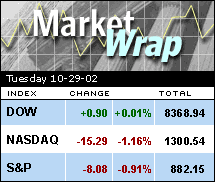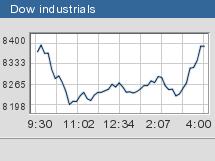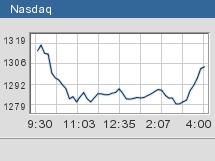NEW YORK (CNN/Money) -
U.S. stocks ended mixed Tuesday after the Dow Jones industrial average staged an impressive late-session recovery that pulled blue chips and the broader market out of a deep slump triggered by a dismal consumer confidence report.

The Dow Jones industrial average (up 0.90 to 8368.94, Charts) closed at breakeven. The blue-chip index was down close to 200 points at its session low. The Nasdaq composite (down 15.29 to 1300.54, Charts) and the Standard & Poor's 500 index (down 8.08 to 882.15, Charts) also pared losses.
Procter & Gamble lifted the Dow out of negative territory in the final half-hour of trading, but the Nasdaq suffered from weakness in networking and wireless stocks.
Stocks also appeared to reverse course after news reports indicated that an explosion of a fuel tank on a FedEx 18-wheeler in Missouri was the result of an accident and not terrorist related.
"Stocks moved up after reports said the incident was an accident. But I think the bigger story is that there is a pattern developing where there is a growing pool of buyers that are consistently coming in and buying on weakness," said Charles Payne, CEO and stock market strategist with Wall Street Strategies.
The market stayed in a selloff mode for most of the session after the latest reading on consumer confidence saw a big drop in October, hitting its lowest level in almost nine years. The Conference Board's index fell to 79.4 from 93.3 in September; analysts had forecast a reading of 90, on average.

But the market avoided a more dramatic selloff despite the worse-than-expected data after a late-day bout of short-covering. Short-covering occurs when traders who have been betting that stocks will continue to fall are forced to buy to cover their positions.
Analysts added the soft consumer confidence number will likely heighten expectations for an interest rate cut next month.
"That fact alone could act as a stabilizing force for the market this week," said Tony Dwyer, chief market strategist with Kirlin Securities. "The U.S. consumer has been the linchpin of this economy. So this number doesn't bode well, especially as we enter the Christmas shopping season and retailers are already suffering because of the West Coast ports dispute."
Some market watchers said sentiment ahead of the data was already biased to selling after a three-week runup.
Larry Wachtel, market analyst with Prudential Financial, called the pullback more of a knee-jerk reaction by investors who are keeping money on the sidelines until the market gets through the rest of the week's reports.
"The consumer sentiment index is a subjective index. If you look back at its history this year, every downtick in consumer sentiment hasn't necessarily translated into a drop in consumer spending. Investors know that. It's a case of 'Do as I say and not as I do.' That's why we haven't fallen off a cliff today with a 200- or 300-point drop."
Market breadth was negative. On the New York Stock Exchange, decliners beat advancers 9-to-7 as 1.4 billion shares traded. On the Nasdaq, losers topped winners more than 4-to-3 as 1.5 billion shares changed hands.
With 25 of the 30 Dow components and about three-quarters of the S&P 500 companies having reported their quarterly results, the market focus is squarely back on the economy and the Federal Reserve meeting on interest rates next week.
Later in the week, investors will also get crucial data on the health of the nation's manufacturing sector and the October employment number.
So far, October has been good for stocks, with the major indexes about 9 percent higher after stocks locked in their third consecutive weekly advance last week. If the gains hold through Halloween on Thursday, it will be the first time all three indexes have been up for the month since March.
Procter & Gamble props Dow, oil slips
Consumer products maker Procter & Gamble (PG: up $3.26 to $89.01, Research, Estimates) propped the Dow after making a solitary run as a winner for most of the session. The company beat profit estimates for its first quarter.
But shares of oil company Exxon Mobil (XOM: down $1.41 to $33.23, Research, Estimates) dragged on the Dow after a warning from British oil leader BP (BP: down $2.67 to $36.78, Research, Estimates), which cut its oil and gas output forecast for the third time this year. Sectormates ConocoPhillips (COP: down $1.32 to $46.74, Research, Estimates) and Amerada Hess (AHC: down $2.62 to $49.68, Research, Estimates) traded lower.
Retailers were a weak spot on the blue-chip index. Wal-Mart (WMT: up $0.40 to $56.47, Research, Estimates), the world's biggest retailer, said late Monday that sales at its Sam's Club Warehouse chain were trailing expectations. Separately, two industry reports showed a drop in chain store sales last week, raising the specter of concern about the critical holiday shopping season.
Weakness in networking stocks damaged the tech-laden Nasdaq after Cisco Systems (CSCO: down $0.30 to $10.60, Research, Estimates) and Brocade Communications (BRCD: up $0.13 to $6.96, Research, Estimates) brought bearish news to the table.

UBS Warburg trimmed its revenue estimates for Cisco's January quarter, citing flat sequential sales from October, while CE Unterberg Towbin downgraded the stock to "market perform" from "buy," citing valuation concerns.
J.P. Morgan slashed its 2002 and 2003 revenue and earnings estimates on Brocade a day after the maker of networking technology warned about its fourth quarter, citing continued weakness in information technology spending.
Qwest Communications (Q: down $0.28 to $3.18, Research, Estimates), once among the leaders in the beleaguered telecom sector, drifted lower after announcing late Monday that the company would take charges of up to $40.8 billion to write down the value of its goodwill and network assets as it struggles to clean up its books.

In the wireless arena, Qualcomm (QCOM: down $1.70 to $33.69, Research, Estimates) shares continued to slump a day after South Korea said it was banning its four largest telecom firms -- all of whom use Qualcomm's wireless technology -- from signing new subscribers for 30 days. The telecoms are accused of offering illegal mobile phone subsidies to customers. A quarter of Qualcomm's revenue comes from South Korea, according to news reports.
BP's warning and a formal probe into Vivendi Universal (V: Research, Estimates)'s accounting sent European markets lower, while Asian-Pacific stocks dipped, with Tokyo's Nikkei index down 0.6 percent.
Treasury prices rallied, sending the 10-year note yield down to 3.92 percent from 4.08 percent late Monday. The dollar slipped against the yen and was flat against the euro.
Light crude futures slipped 43 cents to $26.86 a barrel in U.S. trading, while gold edged higher.

|

